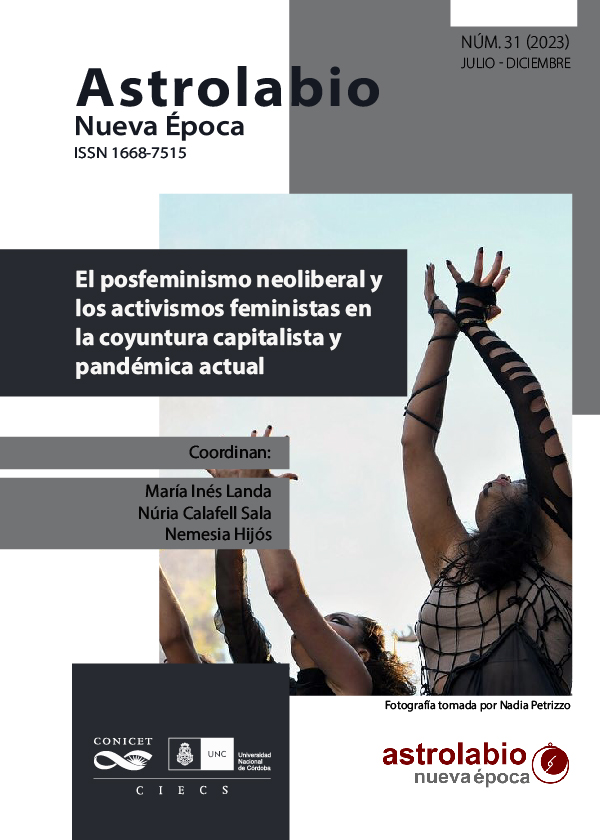The Fitness Dispositive in Postfeminist Healthism: Women Empowerment Discourses through Body Discipline
Main Article Content
Abstract
The aim of this research is to analyze the new discourses around women’s bodies in the postfeminist context, paying special attention to the emerging “fit sensitivity”, which configures a new discursive node. I explore the tensions between the new feminist proclamations of women’s liberation and the persistence of patriarchal demands, in what seems to be resolved under the strategy of total alignment between one’s own desire and the desire of the system, through narratives of body care, self-love and personal development.
For this purpose, I work through three central concepts, namely “postfeminism” (Gill, 2007), “healthism” (Crawford, 1980) and “fitness dispositive” (Costa, 2010), which I relate to the figure of the “entrepreneur of the self” as theorized by Michel Foucault. All this will be exemplified in a paradigmatic publication of this type of discourse, Fitness emocional. Una potente herramienta de bienestar personal (2017), by Nessi Arauz.
This work seeks to delve into and expose the different power networks found in new postfeminist discourses of “empowered women”, which are imbued within healthism discourses and can be framed within the new psychological turn of neoliberal rationality.
Downloads
Article Details

This work is licensed under a Creative Commons Attribution-NonCommercial-ShareAlike 4.0 International License.
Astrolabio, Nueva Época está protegida bajo licencia Licencia Creative Commons Atribución-NoComercial-CompartirIgual 4.0 Internacional. La propiedad intelectual de los artículos pertenece a los autores y los derechos de edición y publicación a la revista. Los artículos publicados podrán ser usados libremente para propósitos científicos y académicos, siempre y cuando se realice una correcta citación de los mismos. Cualquier persona física o jurídica que desee reimprimir parte o la totalidad de algún artículo, deberá obtener permiso escrito de los editores de Astrolabio Nueva Época, quien lo otorgará con el consentimiento del autor.
References
ARAUZ, Nessita. (2017). Fitness emocional. Una potente herramienta de bienestar personal. Barcelona: Ediciones B.
CAIRNS, Kate y JOHNSTON, Josée. (2015). “Choosing health. Embodied neoliberalism, post-feminism and the do-diet”. Theory and Society, 44, 153-175.
COSTA, Flavia. (2010). La vida como información, el cuerpo como señal de ajuste: los deslizamientos del biopoder en el marco de la gubernamentalidad neoliberal. En Vanesa Lemm (ed.), Michel Foucault: biopolítica y neoliberalismo, pp. 151-173. Santiago de Chile: Ediciones UDP.
COSTA, Flavia. (2015). “Nuevos cuerpos productivos. Fitness, gubernamentalidad y el sentido oculto de la «buena presencia»”. Artefacto, 8-4, 1-26.
CRAWFORD, Robert. (1980). “Healthism and the medicalization of everyday life”. International Journal of Health Services, 10-3, 365-388.
CRAWFORD, Robert. (2006). “Health as a meaningful social practice”. Health, 10-4, 401-420.
FOUCAULT, Michel. (1995). Tecnologías del yo y otros textos afines. Barcelona: Paidós.
FOUCAULT, Michel. (2001). El nacimiento de la clínica. Una arqueología de la mirada médica. Madrid: Siglo XXI.
FOUCAULT, Michel. (2007). Nacimiento de la biopolítica. Curso en el Collège de France (1978-1979). Buenos Aires: Fondo de Cultura Económica.
FOUCAULT, Michel. (2016). Historia de la sexualidad. 1. La voluntad de saber. Madrid: Siglo XXI.
GARD, Michael y WRIGHT, Jan. (2005). The obesity epidemic. Science, morality and ideology. New York: Routledge.
GILL, Rosalind. (2007). “Postfeminist media culture. Elements of a sensibility”. European Journal of Cultural Studies, 10-2, 147-166.
GILL, Rosalind. (2008). “Culture and subjectivity in neoliberal and postfeminist times”. Subjectivity, 25, 432-445.
GILL, Rosalind. (2016). “Post-postfeminism?: new feminist visibilities in postfeminist times”. Feminist Media Studies, 16, 610-630.
GILL, Rosalind y ORGAD, Shani. (2022). Confidence culture. London: Duke University Press.
HAKIM, Catherine. (2012). El capital erótico. El poder de fascinar a los demás. Barcelona: Debate.
LANDA, María Inés. (2011). Las tramas culturales del fitness en Argentina. Los cuerpos activos del ethos empresarial emergente. Tesis de Doctorado en Teoría Literaria y Literatura Comparada, Universitat Autònoma de Barcelona.
LAVAL, Christian y DARDOT, Pierre. (2013). La nueva razón del mundo. Ensayo sobre la sociedad neoliberal. Barcelona: Gedisa.
LE BRETON, David. (2002). Antropología del cuerpo y modernidad. Buenos Aires: Nueva Visión.
MURRAY, Samantha. (2008). The “fat” female body. New York: Palgrave Macmillan.
RILEY, Sarah y EVANS, Adrienne. (2018). Lean light fit and tight: Fitblr blogs and the postfeminist transformation imperative. En K. Toffoletti, H. Thorpe y J. Francombe-Webb (eds.), New Sporting Femininities. New Femininities in Digital, Physical and Sporting Cultures, pp. 207-229. London: Palgrave Macmillan.
RILEY, Sarah; EVANS, Adrienne; y ROBSON, Martine. (2019). Postfeminism and health. Critical Psycology and Media Perspective. New York: Routledge.
VÁZQUEZ GARCÍA, Francisco. (2005). Empresarios de nosotros mismos. biopolítica, mercado y soberanía en la gubernamentalidad neoliberal. En Francisco Javier Ugarte Pérez (coord.), La administración de la vida: estudios biopolíticos, pp. 73-103. Barcelona: Anthropos.
WOLF, Naomi. (2015). The beauty myth. London: Vintage Books.
WRIGHT, Jan y HARWOOD, Valerie. (2009). Biopolitics and the “obesity epidemic”. Goberning bodies. New York: Routledge.

